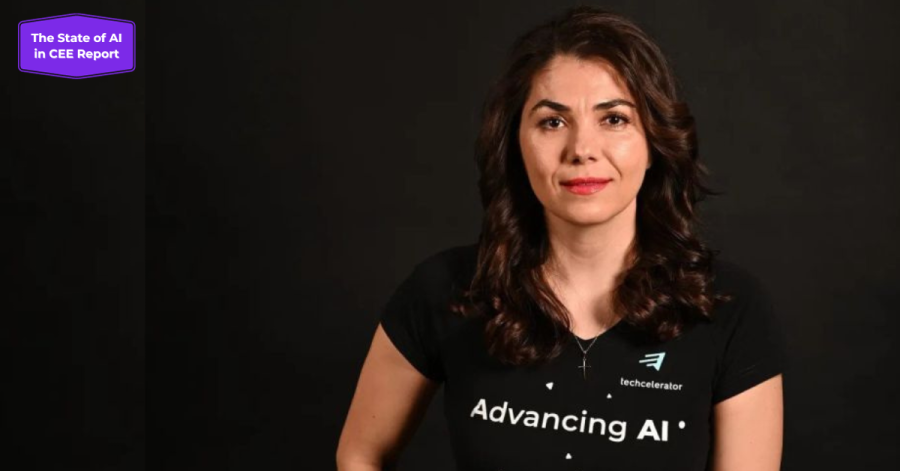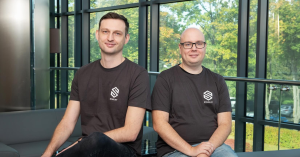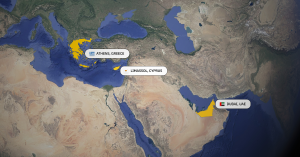“The cost of living and operating businesses in the CEE region is still lower compared to Western countries. This cost advantage can be attractive to investors and companies looking to maximize their AI development budget while maintaining high technical expertise. Romanian and CEE startups can showcase their ability to provide high-quality AI solutions at a competitive price,” Cristina Toncu, the co-founder of the Romanian startup program Techcelerator, shares with The Recursive.
Cristina has been the Co-founder and Programs Partner of Techcelerator for the past six years. The program targets creative, innovative, and prolific startups to enroll them in a ten-week acceleration program that will help them reach market fit through dedicated pre-seed and/or seed investment rounds.
She is also the Regional Director of the Romanian Tech Startups Association (ROTSA), and an angel investor at Bravva Angels. She has been supporting the entrepreneurship ecosystem in various roles since 2007.
The following interview was conducted as a part of The Recursive’s “State of AI in CEE” report. Download the full report with insights from 40+ experts and an analysis of 900 AI product companies from CEE here.
The Recursive: Techcelerator has been supporting AI startups in Romania since 2018. How has the ecosystem evolved since then?
Cristina Toncu: When Techcelerator started its activity, AI was not necessarily our main focus. The reason was that the Romanian startup community was not strong enough to pick up a certain space or another to support. There was a general need for knowledge and support from founders and industries. Looking back, we had a few alumni with ML activities back then, but we did not treat them necessarily differently.
Today, businesses in Romania using AI are boosting. However, our country ranks last in Europe in terms of the proportion of companies using AI, with only 1%, 12 times less than Slovenia. The Techcelerator and Google for Startups AI Map Report, 2nd edition, recently published, shows that the number of new companies implementing AI technology in Romania has grown by 50%.
What are the current trends that dominate the field of AI in Romania?
We should not approach the AI trends locally. It is a global shift now with the developments of LLMs and new open-source AI products of the big, global companies. Tech founders understood quickly that not considering AI and big data into their products might lead to slower growth or even failure.
The European Deep Tech Report issued by Dealroom concludes that deep tech startups raised 17.7 billion euros in 2022, a 22% decrease from the previous year. Also, the report emphasizes four main categories of deep tech that will shape the future: Novel AI, Future of Computing, Novel Energy, and Space Tech, followed closely by Climate Tech.
How is Techcelerator assisting these startups?
In 2020, we had a voluntary approach to AI products, when we designed our AdvancingAI program in partnership with Google Romania and Google for Startups. This is an accelerator program of three months explicitly dedicated to AI / ML products, focusing on data management and training and technology challenges and novelties approached by local and international mentors.
We have rolled out three cohorts of this program and we are preparing to launch the fourth one this autumn. Among our alumni, we have RepsMate (620,000 Euro funding), MOCAPP (900,000 Euro), Synaptiq (670,000 Euro), and VoxiKids (275, 000 Euro).
In the Open AI context, these technologies request even more attention from our side, as it happens in the investment sector and the digital transformation needs of all companies who want to stay relevant in the market.
How can Romanian and CEE AI talent and companies differentiate themselves in a hypercompetitive Western innovation environment?
In Romania, we have the advantage of a smart approach, unique talents, high innovators, and early adopters. I think this restless attitude made Romanians and other similar close neighbors always differentiate, in any environment.
Cross-Disciplinary Collaboration: CEE countries often have strong backgrounds in engineering, mathematics, and related technical fields. Leveraging this foundation, AI startups and talents can differentiate themselves by fostering collaboration between these technical disciplines and other domains such as healthcare, finance, agriculture, and manufacturing.
Cost-Effectiveness: The cost of living and operating businesses in the CEE region is still lower than in Western countries. This cost advantage can be attractive to investors and companies looking to maximize their AI development budget while maintaining high technical expertise.
Strong Math Skills: The region has a strong tradition in mathematics, engineering, and computer science, which forms the foundation of AI technologies. So, we have the educational basis to develop cutting-edge AI models, optimization techniques, and advanced algorithms that solve complex problems effectively.
Global Collaboration and Partnerships: CEE AI startups can leverage cross-border collaboration and partnerships to gain access to global markets and networks. Building relationships with Western AI companies, research institutions, and investors can help them tap into larger ecosystems and gain exposure to international best practices.
Agility and Flexibility: Startups and companies from Romania and CEE tend to be more agile and adaptable due to the dynamic and challenging business environments in which they often operate. They are founders “at the frontier”, as the venture capitalist, Alexandre Lazarow points out in his book, Outinnovate. This flexibility allows them to quickly pivot, innovate, and respond to changing market demands.
Showcasing the successful AI startups in the region may encourage and motivate other wannabe founders with appropriate tech skills to start developing their AI products. Rayscape, Flowx.AI (Romania), Payhawk (Bulgaria’s first unicorn), or Gideon Brothers (Croatia) are some of the extraordinary success stories of the region.
What is currently missing or you would like to see more of when it comes to AI and deep tech innovation support in Romania?
Deep tech is rare in Romania because of a lack of expertise and funding. Deep tech requires a longer time to market and considerably more investment, two factors that local venture capital funds are not yet prepared to easily “endure”.
Deep tech projects today have access to European funding through the European Innovation Technology Accelerator (EIC). This is public money blended with private. So, public money is still needed to develop deep tech products that involve a higher research rate and bigger teams of experts. The same big corporations have resources and patience and seem to be willing to support the development of such products, like in the pharma industry.
What do we need to do to advance collaboration efforts between businesses, the scientific and academic communities, and state actors when it comes to AI?
Advancing collaboration efforts between businesses, the scientific and academic communities, and state actors in AI requires a multi-faceted approach that encourages synergy, fosters innovation, and addresses common challenges. Some strategies may include: establishing collaborative platforms (such as innovation hubs, research entities, and partnerships between industries and academia) or creating regulatory sandboxes that allow businesses and researchers to test and develop AI solutions in a controlled environment. This approach can foster innovation while addressing potential ethical, legal, and regulatory challenges.
A crucial step would be to adapt the education curricula fast, at least in universities, to develop educational programs that bridge the gap between academic and industry needs. We need to encourage universities to offer AI curricula that align with the latest industry trends and demands, ensuring that graduates are well-prepared to contribute meaningfully to AI projects.
Policy and regulation are vital and must keep pace with European and International advancements. Clear guidelines and regulations can provide a level playing field while meeting ethical considerations.
The former Ministry of Research talked recently in the Techcelerator AI Map Report about the Romanian Committee for Artificial Intelligence, an ambitious initiative that will support the development of new entities relevant to the field of AI. These include the Scientific and Ethical Council in Artificial Intelligence and the Coalition for AI, a consultative initiative aimed at aggregating representatives from the private sector, providing them with the opportunity to develop common opinions that can be presented to decision-makers, and integrating the perspectives of the private and innovation sectors into the development of public policies regarding AI in Romania.








